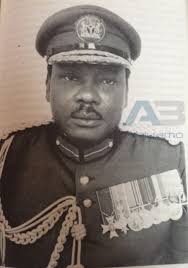The Road We Should Not Have Taken By Dan Agbese


When life in the present tense becomes difficult or outright a hard scrabble, it is both easy and tempting to wallow in the somnolence of nostalgia. And romanticise the past as the golden period of our national history. But it is difficult not to look back against the advice of the late Lt-Col Emeka Odumegwu Ojukwu who said that if the almighty wanted us to look back, it would not have been beyond him to provide us with a pair of eyes in the back of our heads. This from an Oxford trained historian.
The business of history is to hold the mirror to the present tense of life and force us to see the footprints of the doers and thinkers who were here and who are, God being so kind, now lapping it up in the luxuries of the Eternal City up in the clouds. We must look into the past, not as a mirror but as a source of inspiration as we negotiate the tortuous bends of the paradigms of development.
However, our willingness or even our capacity to peep into the past runs against a formidable granite wall called military propaganda. The propaganda advises us against looking back to two important periods of our national history divided between military incursions. I refer to the First Republic, which lasted from October 1, 960 to January 15, 1966; and the Second Republic that lasted from October 1, 1979 to December 31, 1983.
Military propaganda tells us it would be foolish to be nostalgic about them. They are periods best forgotten, according to the military propaganda, because our leaders in each of those periods led us down the wrong path and thus forced the military to intervene to turn our nation back from the way to Golgotha.
This propaganda has been positively detrimental to our developmental health as a nation. When a nation swings between the good and the bad with no grey areas in between, it leads to a pronounced disconnect between the past and the present. You could not connect military doers and thinkers with civilian doers and thinkers because you would be mixing saints with sinners, for which, heaven forfend. Something is bound to give.
What gives in this case is our inability to marry the good in the military with the good in the civilian regime. This, for me, partially explains why our nation is in a perpetual swing, unable to hold on to a development paradigm deemed by thinkers to change our fortunes and free us, for instance, from our current total dependence on crude oil earnings at all levels of government. The easy money stifles creativity, hence the lack or the poorly internally generated revenue in the states. I am sure you do notice the number of abandoned projects throughout the country. Projects begun by a civilian regime are abandoned by the succeeding military regime. And, of course, projects began by one civilian governor is abandoned by his fellow civilian successor.
Someone once estimated the cost of the abandoned projects down the length and breadth of the country at five trillion Naira. This, of course, is a chicken feed in an oil rich nation. Yes, Nigerian chickens are unwisely given to gluttony. But beyond the loss of money to the public that these abandoned projects represent are the loss of hope and the despair they inflict on the people.
This is not likely to change so long as we accept that the past is a burden on the present. Why drag a burden along when, with your signature, contractors can help you embark a new set of projects destined to be abandoned sooner than later? We hail our country, as indeed, our national anthem obligates us to do.
I give three instances of pragmatic civilian thinkers in response to either the problems they confronted or as a means of giving the nation a leg up in focused development. I draw my three instances from the Second Republic, sadly tarred and feathered by military propaganda.
Today we face a housing crisis throughout the country. The sight of fellow Nigerians sleeping under bridges and uncompleted buildings in our towns and cities could be pleasing only to sadists. President Shehu Shagari saw it coming. He initiated a low cost housing project in each of the then 19 states. It was a proper and pragmatic response to what would likely give rise to a national scandal. Sadly, it was politicised. The late Chief Bola Ige, governor of old Oyo State, would not even give the president land in the state for the project. The triumph of politics has never been, and never will be, healthy for national development.
These houses were completed in some of the states but they were abandoned in many other states. The military never even bothered to give a thought to reviving and sustaining the housing projects. They most certainly accounted the housing projects as an act of folly or corruption by the civilian regime. I say no more.
Go-slow was a major problem in the Lagos metropolis in the seventies. It is not as bad now but still bad enough. Governors before Alhaji Lateef Jakande had tried all sort of solutions, including park-and-ride and even numbers and odd numbers, all of which made no discernable impression on the traffic bottleneck in the city. Alhaji Jakande, the action governor of Lagos State in the Second Republic, thought hard about this and came up with a novel idea to address the worsening traffic congestion. His preferred solution was an underground railway system. He borrowed a leaf or two from other major cities in the world such as London and New York that show the wisdom of an underground rail system.
An underground rail system is cheap and fast. Jakande contracted a French company to build the underground rail system. The company was hard at work on it when the military abandoned the barracks once more for the government house. The first thing the new military governor, Group Captain Mudashiru did was to cancel the project. Why sustain a well-thought out project such as this conceived by a civilian governor?
Then come with me to my state, Benue. Mr. Aper Aku, was our governor in the Second Republic. Let me add that I served that government for 17 months. But this is not about romanticising the past. I am telling it as it was.
The Tiv area of Benue State is the largest producer of soya beans in the country. Much of it was exported or sold in other parts of the country with minimal earning for the farmers. Aku decided it would be more helpful to the farmers and the internally-generated revenue of the state if he turned the soya bean into raw materials for an agro-industry. The state government went into partnership with a Swiss company, I believe, and set up the Taraku Oil Mills. It was a very good agro-industrial project. The soya beans farmers had a good and ready market. It encouraged them to produce more and earn more money.
Again, the succeeding military government accounted it a foolish act. The Oil Mill has since been abandoned. The farmers lost; the state lost and the hundreds of distributors and transporters of the product lost. It closed the door to other possible agro-industrial projects using readily available raw materials in the state.
I have given these three examples to show that the colours of the clothes we wear have nothing to do with wisdom or foolishness. Thinking, pragmatic thinking, is a function of the grey matter, not the rustling of khaki or agbada. Let me add, on a final note, that a disconnect between the past and the present is no way to build or develop a country. It is a wrong road and one we should not have taken.








